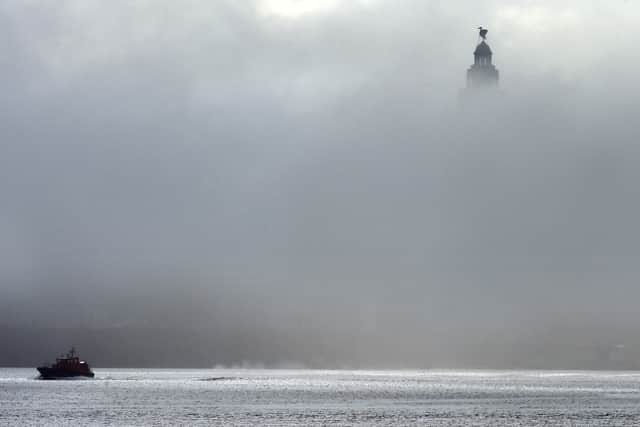Liverpool weather: Met Office issues yellow status weather warning for fog - Mersey Ferries disrupted
and live on Freeview channel 276
A yellow status Met Office weather warning is in place for Liverpool. The alert was issued shortly before 2am on Tuesday and will remain active up until 11am.
“Areas of fog, dense in places, have developed and will be stubborn to clear through much of this morning,” reads the warning on the official Met Office website.
Advertisement
Hide AdAdvertisement
Hide Ad“Whilst some fog is likely to persist all day, many places will see this lifting into low cloud or clear by this afternoon.”
Mersey Ferries confirmed that early morning services have been suspended due to the fog, although some commuters services resumed from 9am. Check the social media feed for the latest updates.
What to expect:
- Slower journey times with delays to bus and train services possible.
- There is a chance of delays or cancellations to flights.
How fog affects travel
Fog is a major travel hazard which can lead to problems of visibility when travelling.
Fog tends to be more of an issue in colder periods. It is far less likely to affect summer travel but can occur in spring and autumn - at the beginning and end of the main holiday season. Things to bear in mind when planning your journey are that fog can be very localised, so may not be apparent when you set off, and it can affect air travel and the roads in different ways.
Advertisement
Hide AdAdvertisement
Hide AdHow thick is fog?
The official definition of fog is a visibility of less than 1,000 m. This limit is appropriate for aviation purposes, but for the general public and motorists an upper limit of 200 m is more realistic. Severe disruption to road transport occurs when the visibility falls below 50 m. Useful labels for these three categories are aviation fog, thick fog and dense fog.
How do we forecast fog?
It can be very tricky to forecast fog. Fog forms when moisture in the air is cooled to its ‘dew point’. This is the temperature at which air will condense from water vapour into water droplets. This is the same effect you get when warm moist air comes into contact with a cold bathroom mirror. While vapour is relatively transparent, droplets reflect light and therefore reduce visibility. When this reduction in visibility gets below 1,000 metres it officially becomes fog.
Fog that affects us in cooler season
Fog usually occurs in the late autumn and winter months, when conditions tend to be colder, and nights are longer. This type of fog forms as a result of clear skies and light winds. The land cools overnight and this reduces the ability of the air to hold moisture, allowing condensation and fog to occur.
The fog will often disperse after sunrise, but in some circumstances can last well into the afternoon, and even persist for days on end. This is most likely during January and February, and can cause severe disruption at airports, as well as on roads and for other types of transport.
Advertisement
Hide AdAdvertisement
Hide Ad

Travel disruption due to fog
Fog can particularly affect road and air travel due to reduced visibility.
According to the Highway Code headlights should be used when visibility is below 100 metres. Before setting off on a foggy journey, drivers should make sure their lights - especially fog lights - are working properly.
(Source: The Met Office)
Comment Guidelines
National World encourages reader discussion on our stories. User feedback, insights and back-and-forth exchanges add a rich layer of context to reporting. Please review our Community Guidelines before commenting.
